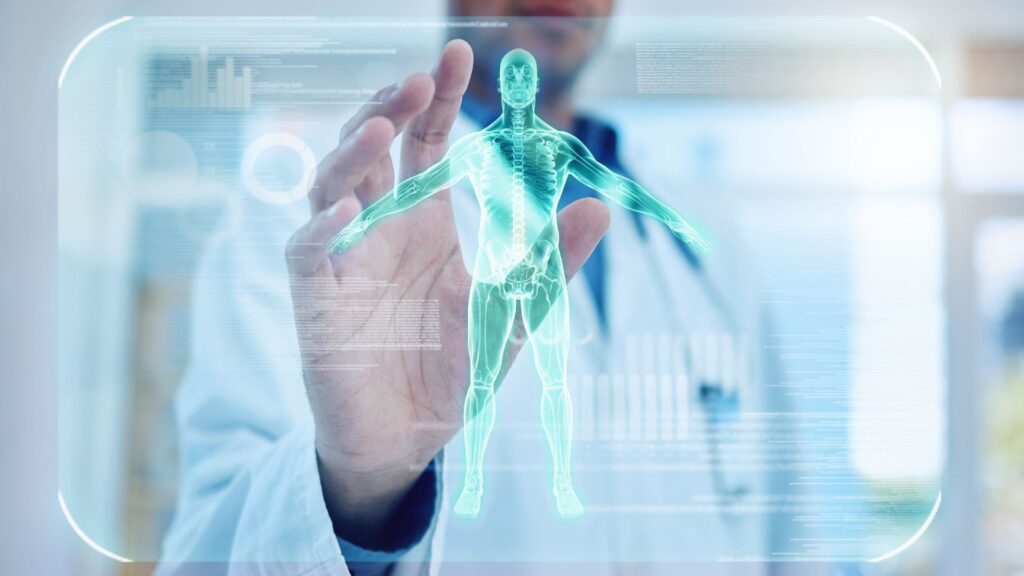
The human relationship between patient and caregiver ensures well-being and trust in the healthcare system. With the advent of new technologies in the medical landscape, notably Artificial Intelligence (AI), this relationship is gradually being transformed, giving rise to a duality. On the one hand, there is the hope that the integration of AI will free up time for healthcare professionals, thereby strengthening patient support, and on the other, the fear of dehumanizing care. With the launch of the “Digital Health” scheme in 2021, an initiative promoting the emergence of innovative digital health solutions, and the growing adoption of AI by caregivers (54% in 2024)(1), France aims to position itself as a world leader in e-health. Against this backdrop, how can we ensure that AI serves the interests of both professionals and patients, while preserving the quality of the patient-caregiver relationship?
Integrating artificial intelligence into the healthcare sector
AI offers numerous opportunities for medical teams and care centers. Despite concerns about the possible dehumanization of care, statistics show significant adoption of AI by healthcare professionals. Among its most widespread uses, it facilitates access to medical information (46%), offers specialized training to healthcare professionals (37%) and contributes to the prescription of appropriate treatments (28%).(2)
Its growing integration into medical practices and hospital systems, thanks to technologies such as conversational agents and health monitoring applications, means that patients benefit from access to comprehensive medical information, as well as faster advice. According to Salesforce, 86% of customers prefer to get a response from a chatbot rather than fill in a form on a website, a preference also observed in the healthcare sector. Chatbots offer a personal and anonymous alternative for interacting with healthcare services.
Automate administrative tasks to optimize patient care.
Chatbots are particularly effective in automating and simplifying administrative formalities, as well as providing access to medical information. Thanks to their ability to handle multiple requests simultaneously, bots reduce waiting times, improving the patient experience and boosting satisfaction rates. Accessible 24/7, they offer an immediate, automated response to recurring requests, such as booking appointments, opening hours, issuing medical documents or administrative procedures. It’s also a way of redirecting patients to the right specialty, providing preventive care, and offering initial advice on a wide range of subjects, such as smoking cessation, stress management or healthy eating.
These benefits are not limited to patients, but also benefit healthcare professionals. By considerably reducing the time spent on administrative tasks, and freeing them from these repetitive responsibilities, chatbots enable caregivers to devote more time to listening to and accompanying patients, thus reinforcing the human relationship at the heart of care. In fact, 71% of them would like AI to help them manage administrative tasks(3).
However, adopting this technology is not without its challenges and risks. Chatbots are not designed to make diagnoses, nor are they intended to replace healthcare professionals. On a technical level, healthcare chatbots need to be rigorously designed to ensure the accuracy and reliability of the information provided. In addition, there are concerns about data security and the confidentiality of patient information, requiring special attention to ensure transparency and user trust.
The need to protect medical confidentiality
Ensuring the protection of medical secrecy and its ethical use is essential if AI is to benefit both professionals and patients. At present, the deterioration of the doctor-patient relationship is one of the main concerns of 49% of doctors. Familiarization with AI is necessary for its effective use, while making them aware of the associated ethical, legal and social issues. Furthermore, it is vital to ensure that these AIs are used responsibly, by establishing clear standards and regulations to protect patient privacy and guarantee the transparency, reliability and confidentiality of the systems used. To this end, HDS (Health Data Hosting) certification has been introduced to reinforce the protection of personal health data and build a climate of trust around e-health and patient monitoring.
Rather than fearing the dehumanization of medicine, AI should be seen as essential tools for tackling the major challenges facing the healthcare sector. Medical chatbots are a concrete example of the positive impact of artificial intelligence in the medical field. By relieving professionals of time-consuming and repetitive tasks linked to administrative management, medical chatbots complement traditional services, enabling caregivers to focus on their primary mission: offering personalized, quality care to every patient.
Source : AI in healthcare: ally or threat to healthcare professionals? PulseLife (ex 360 medics / Interaction Healthcare) – January 2024






